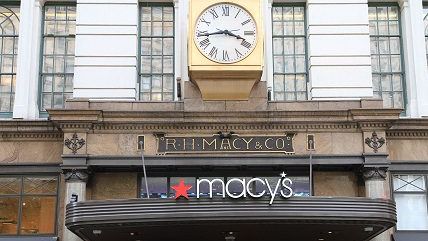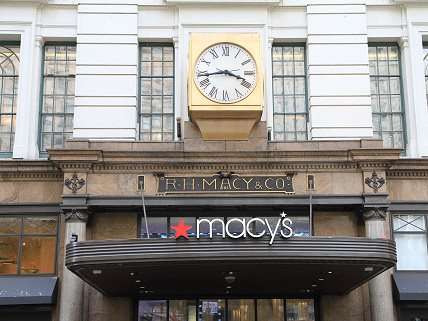No Mercy for Macy's
To ascribe racist motives to Macy's officials is a leap in logic.


The quest for racial harmony extends beyond the streets of Ferguson, Missouri. It extends to the unlikeliest of places, such as the pantyhose section at Macy's.
Last month, Macy's agreed to pay $650,000 in response to more than a dozen complaints that it had engaged in racial profiling and false detentions at its flagship store in Manhattan's Herald Square. After an 18-month investigation, New York state officials concluded that Macy's "detained minorities for allegedly shoplifting at significantly higher rates than whites."
New York Attorney General Eric T. Schneiderman said, "It is absolutely unacceptable—and it's illegal—for anyone in New York to be treated like a criminal simply because of the color of their skin." It is also unacceptable to insinuate that a company like Macy's treats minorities like criminals "simply" because of their skin color.
According to the terms of the agreement, Macy's must appoint an expert on racial profiling, post in its store a customers' bill of rights explicitly prohibiting racial profiling, train its employees on "anti-profiling," and pay $650,000, not to the alleged victims but to the state of New York. These steps, Schneiderman said, "will help ensure that no one is unfairly singled out as a suspected criminal when they shop in New York."
No, they won't. Part of being a suspected criminal is that people don't know if you are a criminal. Shoplifters don't wear signs saying "I Plan on Stealing Today." Catching them is a guessing game; and, inevitably, some of the guesses will be incorrect. Security officials, whose job is to be suspicious, are bound to make mistakes. The question is whether their mistakes are errors in judgment or malicious in intent.
Quite a few people suspect the latter. Assemblyman Walter T. Mosley (D-Brooklyn) said, "When they engage in retail profiling, they are engaging in racism." A lawsuit filed by an African-American couple last year accused Macy's of "not wishing to sell to African-Americans because of their color," which is highly improbable. Does anyone really think that Macy's does not want to sell to African-Americans? That it would rather harass them than make money off them?
To ascribe racist motives to Macy's officials is a leap in logic, uncorroborated by the known facts. For one thing, Macy's had grounds to be concerned about theft. According to crime statistics from the NYPD, grand larceny rose 31.6 percent from 2011 to 2013 in the precinct of Macy's Manhattan store. In 2002, that store lost $15 million to theft.
Did this necessitate racial profiling? Not necessarily. For its part, Macy's claims that its "policies strictly prohibit any form of discrimination or racial profiling." Even if it did engage in racial profiling, we do not know whether race was the sole factor in the apprehension of suspects, although that is unlikely: elderly black women tend to arouse less suspicion than do young white males.
And yet there is the impression, fostered by Schneiderman, that Macy's loves violating the civil rights of minorities. To target individuals "simply" because of their race is not only morally reprehensible; it is also a bad business practice. Successful businesses please their customers. They do not detain and handcuff them willy-nilly.
There are racists in business, but there are few racist businesses. Donald Sterling may have had nasty thoughts about African-Americans, but he did not buy the Los Angeles Clippers in order to persecute them. In the end, profits trump prejudices.
It's hard to defend racial profiling, but it's just as hard to eradicate it, especially in the private sphere. None other than Jesse Jackson once admitted to feeling "relieved" when seeing a white person on an unfriendly street.
Some people think such atavistic thoughts can be eliminated by the stroke of a legislative pen. When running for president in 2000, former Sen. Bill Bradley promised to "eliminate racial profiling at the federal level." Although Bradley has long since retired, his cause has many champions. Among them is Sen. Benjamin Cardin (D-Md.), sponsor of the End Racial Profiling Act of 2013, which the U.N. Committee on the Elimination of Racial Discrimination endorsed just the other day.
As far as Macy's is concerned, the goal should be to reduce wrongful detentions altogether, both in quantity and in severity, not to achieve racial equilibrium by detaining at equal rates persons of all races. If Macy's fails—if it continues to detain innocent people—the least it can do is compensate its victims: say, with gift certificates for pantyhose.


Show Comments (46)